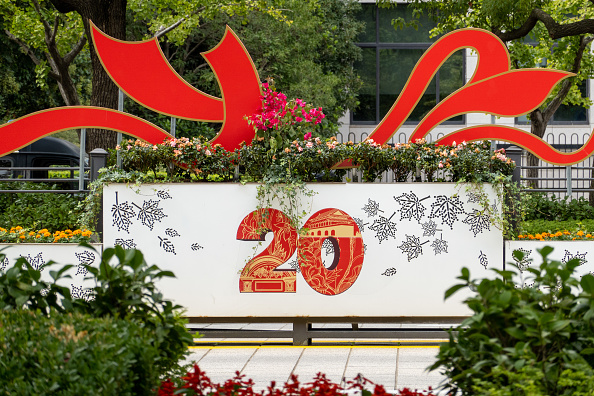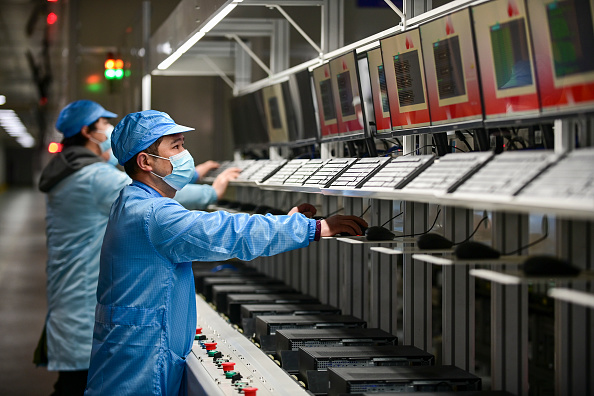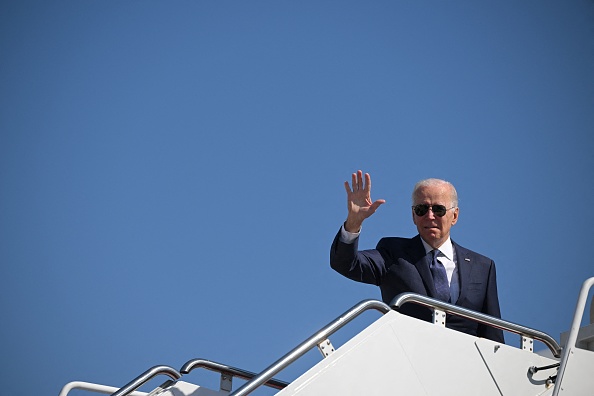
 Party Time
Party TimeTop Chinese leaders are gearing up for the 20th National Congress of the Chinese Communist Party, the once-in-five year gathering that will undoubtedly have both domestic and global impact. The 2,296 delegates are set to convene in Beijing on Sunday, and are tasked with approving plans that will determine the trajectory of the nation over the next five years.
The first Party Congress was almost a full century ago, but the every-five-years timing has only been in place since 1977, as the CCP sought to establish a new sense of order.
The gathering normally lasts several days and includes announcements, resolutions, and the revealing of the new Standing Committee, the small group of core leaders within the 25-person Politburo. Not much is known about who will be promoted into which key roles on the Politburo and its seven-member Standing Committee, though there are some leading contenders.
The Party Congress has also historically seen the replacement of top leadership, including the CCP general secretary and premier. But this year, Xi is expected to change the precedent—the transfer of power from the top party leader, having completed two five-year terms, to a carefully chosen successor—and is poised to cement his role as China's most powerful leader in decades.
As a result, the 20th Party Congress is one of the most significant and closely followed party meetings in years, and will reveal much about the direction of the world's second-largest economy in the coming years.
Learn more in "What is China's Party Congress?," an interview with Cheng Li, the Director of Brookings Thornton Center.
 Decisive Decade
Decisive DecadePresident Joe Biden's first formal national security strategy asserts the U.S. is entering a "decisive decade" as it faces competition with China. The strategy identifies China as "America's most consequential geopolitical challenge" while stressing the importance of rebuilding alliances in order to effectively compete over the coming decade.
"The PRC's assertiveness at home and abroad is advancing an illiberal vision across economic, political, security and technological realms -- in competition with the West," said Jake Sullivan, National Security Advisor.
The 48-page document comes almost two years into Biden's term, and was delayed by Russia's invasion of Ukraine. Throughout Biden's term, he has focused on restoring global partnerships and countering China and Russia. However, with this strategy Biden made clear that over the long term he was more worried about China's moves to "layer authoritarian governance with a revisionist foreign policy" than he was about Russia.
"Russia and the P.R.C. pose different challenges," Biden wrote in his foreword. He characterized Russia as posing an immediate threat to the free and open international system, recklessly flouting the basic laws of the international order today, as its brutal war of aggression against Ukraine has shown. By contrast, China "is the only competitor with both the intent to reshape the international order and, increasingly, the economic, diplomatic, military, and technological power to advance that objective."
Chinese Foreign Ministry spokeswoman Mao Ning said Thursday at a news briefing in Beijing that the U.S. and China should return their "relations to the track of healthy and steady development."
"China and the U.S. are major developing and developed countries," she added. "We have a responsibility for world peace, stability and economic prosperity. China and the U.S. stand to lose from confrontation and gain from cooperation."
 Unilateral Measures
Unilateral MeasuresIn efforts to prevent American technology from advancing China's military power, the Biden administration has unveiled unprecedented action to limit China's access to American technology that powers data centers and supercomputers.
As the most stringent controls by the U.S. government on technology exports to the country in decades, this is part of the U.S. government's plan to counter the Chinese military's rapid technological advances. If successful, it would prevent China from accessing advanced chips and chip production tools and hobble the country's progress towards developing stealth and hypersonic weapons systems. The administration is also expected to try to control the sale of cutting-edge U.S.-made tools to China's domestic semiconductor industry.
In response, the China Semiconductor Industry Association has said it is "disappointed" by recent U.S. export controls and warned they could put more stress on global supply chains.
"Not only will such unilateral measure harm the further global supply chain of the semiconductor industry, more importantly it will create an atmosphere of uncertainty, which will negatively affect the trust, goodwill, and spirit of cooperation that the players of the global semiconductor industry have carefully cultivated over the past decades," the China Semiconductor Industry Association (CSIA) said in a statement.
The new rules bar both U.S. citizens and permanent residents from supporting the "development or production" of advanced chips at Chinese factories without a license. It's the first time export controls on China have extended to people, rather than just organizations or companies.
Prepared by China-US Focus editorial teams in Hong Kong and New York, this weekly newsletter offers you snap shots of latest trends and developments emerging from China every week, while adding a dose of historical perspective.
- 2022-10-07 Elections Incoming
- 2022-09-30 Hot Intrigue
- 2022-09-23 Global Gridlock
- 2022-09-16 Injecting Stability
- 2022-09-09 Cutting Edges
- 2022-09-01 A Win for Global Business
- 2022-08-26 A Heavy Price
- 2022-08-19 Risky Business
- 2022-08-12 Backtracking
- 2022-08-05 Cross-Strait Outrage
- 2022-07-29 Playing with Fire
- 2022-07-22 Nixonian Flexibility
- 2022-07-15 List Diplomacy
- 2022-07-08 Easing Tariffs, Not Tensions
- 2022-07-01 Getting Tough
- 2022-06-24 Tools in the Box
- 2022-06-17 Unprecedented Oversight
- 2022-06-10 Squaring Off
- 2022-06-03 Diplomatic Chills
- 2022-05-27 Competing Visions